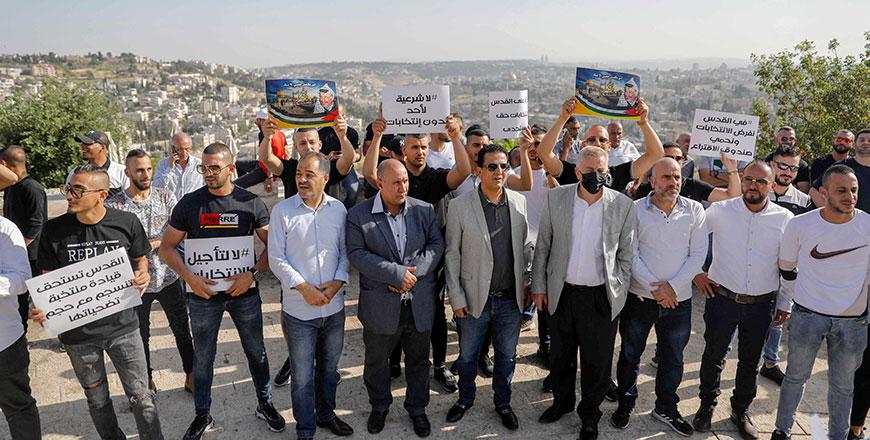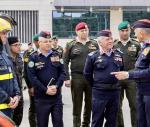You are here
Palestinian leaders weigh delay of long-awaited vote
By AFP - Apr 29,2021 - Last updated at Apr 29,2021

Palestinian supporters of Mohammed Dahlan's ‘Future’Party rally against a possible delay of elections in Jerusalem on Wednesday (AFP photo)
RAMALLAH, Palestinian Territories — Palestinian leaders were set to decide on Thursday whether to hold elections next month as scheduled or call a delay that could trigger further frustration in a divided society which last voted in 2006.
Palestinians in the Israeli-occupied West Bank and blockaded Gaza Strip have voiced hope that the polls could help restore credibility and heal rifts.
Fateh, which controls the West Bank-based Palestinian Authority(PA), reached an agreement with its long-standing rival Hamas, the Islamists who control Gaza, to hold legislative polls on May 22 and a presidential vote on July 31.
The official Wafa news agency said on Thursday that PA president Mahmud Abbas, also Fatah's leader, would chair a meeting "tonight in Ramallah that includes all the political factions to discuss the latest with the elections and whether they should be held or cancelled." "A final decision" would be made before Friday, Wafa reported.
Hamas said on Wednesday it "rejects any attempt to postpone the elections". Hamas won a surprise victory in the 2006 elections but it was not recognised by Abbas. The Islamists took power in Gaza the following year in a week of bloody clashes.
Abbas critics charge that he is seeking to buy time as Fatah's prospects have been threatened by splinter factions, including one led by a nephew of iconic Palestinian leader Yasser Arafat and another by a powerful, exiled former Fateh security chief, Mohammed Dahlan."If Abbas delays elections, we will start with demonstrations," Daoud Abu Libdeh, a candidate with Dahlan's "Future" faction, told AFP in Jerusalem. Jerusalem
Palestinians insist on the right to hold elections in Israeli-occupied East Jerusalem, which Palestinians claim as the capital of their future state. During the last Palestinian election, East Jerusalem residents cast ballots on the outskirts of the city and thousands voted in post offices, a symbolic move agreed to by Israel.
Israel, which now bans all Palestinian political activity across Jerusalem, has not commented on whether it would allow voting in the city. In a meeting with EU diplomats this week, Israeli foreign ministry political director Alon Bar said elections were "an internal Palestinian issue, and that Israel has no intention of intervening in them nor preventing them."
Wafa quoted top official Fateh Mahmoud Aloul as saying that holding elections that excluded Jerusalem would be "treason".
Palestinian journalist and Abbas critic Nadia Harhash, a candidate on the "Together We Can" electoral list, said using Jerusalem as an excuse for postponement "is definitely not a smart move for the PA". She argued it would give Israel de facto veto power over the Palestinian right to vote.
Hamas said a delay amount to a surrender to "the [Israeli] occupation's veto". Tensions in Jerusalem surged at the weekend as Palestinians clashed with Israeli police over the right to gather in an Old City plaza after evening Ramadan prayers.
Following several days of unrest that left dozens injured, Israeli police removed the barricades blocking Damascus Gate, allowing Palestinians to resume their gatherings.
Hamas said such "heroic victories" should encourage Palestinians to press ahead with Jerusalem voting.
Factions - The elections are seen in part as a unified effort by Hamas and Fatah to bolster international faith in Palestinian governance ahead of possible renewed US-led diplomacy under President Joe Biden, after four years of Donald Trump that saw Washington endorse key Israeli objectives. Harhash argued that Abbas had hoped the elections would allow Fateh and Hamas to continue sharing power, but felt threatened by the emergence of strong splinter factions and the rise of new political groups critical of his leadership.
The main challenges to Abbas include the "Freedom list" headed by Arafat's nephew Nasser Al Kidwa, which has been endorsed by Marwan Barghouti, who is serving multiple life sentences in Israel prison. Dahlan, who poses another threat, has been credited with bringing coronavirus vaccines into Gaza and distributing financial aid across the enclave, as well as in the West Bank.
Related Articles
GAZA, Palestine — Palestinian President Mahmoud Abbas' decision to indefinitely postpone elections could rekindle tensions between his secul
President Mahmoud Abbas has halted salary payments to scores of security men loyal to a rival Palestinian politician, deepening disarray within their US-backed Fateh faction, officials said on Thursday.
Talks in Cairo between rival Palestinian factions Hamas and Fateh on reviving their unity government were taking place in a "positive atmosphere" on Wednesday, officials said.















